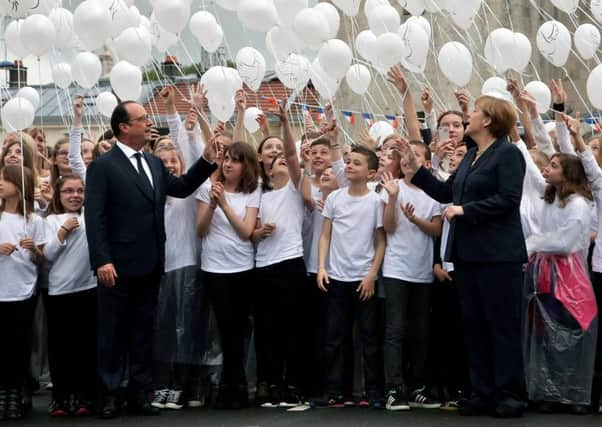Merkel and Hollande mark centenary of Battle of Verdun


Mr Hollande said earlier this week discussions would focus on Europe’s future, including the migrant crisis, security and the rise of populist movements. The Verdun battle was one of the longest in the First World War, lasting more than 300 days from February to December 1916.
Yesterday’s commemorations at Verdun took place in the rain, and Hollande held an umbrella for Merkel and himself as they made their way to the German cemetery Consenvoy to lay a wreath. The leaders then moved on to a ceremony at Verdun city hall.
Advertisement
Hide AdAdvertisement
Hide AdIn her speech there, Mrs Merkel said: “Only those who know the past can draw lessons and build a good future.”
Remembering the famous 1984 image of former leaders Francois Mitterrand and Helmut Kohl holding hands at Verdun, she said: “We have reconciled and reached agreement; we have become friends.”
Mr Hollande also reflected on Franco-German relations, saying that Mrs Merkel’s presence showed that Verdun was not a symbol of suffering but one of hope.
He said: “Verdun... is where Europe lost itself, 100 years ago. But it also experienced the best - the town was capable of galvanising itself, coming together for peace and for Franco-German friendship. Long live the spirit of Verdun.”
The battle’s commemoration has come to signify the close relationship between Germany and France. It was not until 1984 that the neighbours carried out a joint ceremony to mark the Verdun battle, another step towards ending decades of residual hostility and distrust after two World Wars.
That year also saw France and Germany agreeing on the gradual abolition of border checks, a precursor to the Schengen zone of passport-free travel, launched by five European countries the following year.
In 2016, however, some of these foundations of the European Union appear under threat. Britain’s June referendum on EU membership, a rise in Islamist militant attacks, the biggest migrant crisis since World War II and a slow economic recovery have strained relations in the bloc and raised the prospect of a catastrophic euro breakup.
In her weekly podcast, Merkel said Germany’s relations with France had stood fast even when the countries had diverging opinions, and that Europe would have to adapt.
Advertisement
Hide AdAdvertisement
Hide Ad“Europe has problems but Europe has also managed to do a lot and it has come a long way. In a world of global challenges it is important to develop Europe further and to push through the changes that are necessary,” she said.
A commemorative ceremony was also held at the Douaumont Ossuary. Some 4,000 French and German children took part in a performance choreographed by German filmmaker Volker Schloendorff. Church bells then sounded throughout the Verdun area.
Some 60 million shells were fired during the battle. About 25 per cent failed to explode, meaning that housing and farming in the battlefield area are still banned. At the end of the bloodshed in December 1916, France won back nearly all the territory it had lost in February
General Erich von Falkenhayn, the Chief of the General Staff and Germany’s principal strategist, targeted Verdun because of its position on the Allied line and its sentimental value to French people. He hoped to combine the Verdun offensive with a U-boat offensive against British ships.